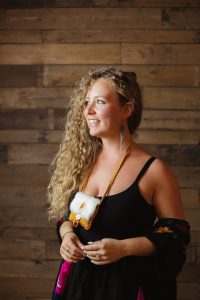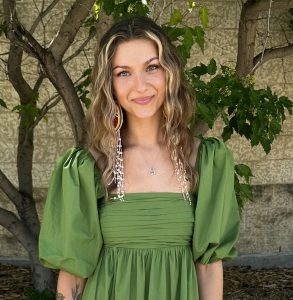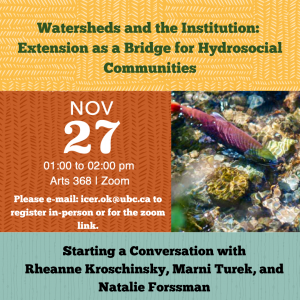Community Engaged Research Data Management Outreach Assistant
NB: This is an Undergraduate Research Assistant role (upper-level undergraduate preferred)
Application Deadline: Sept. 5, 2025
Interviews: Sept. 10 & 11, 2025
Job Description:
The Institute for Community Engaged Research (ICER) unites researchers from a broad range of disciplinary backgrounds, including Anthropology, Gender Studies, Indigenous Studies, Economics, Education, Health Studies, Human Geography, Nursing, Social Work and Sociology.
Sharing a commitment to research that supports diversity, equity, and social justice, the Institute facilitates the participation of community members, organizations, students, and academics as co-researchers. ICER is a hub for building relationships, collaboration, and effective knowledge creation and exchange.
During the fall and winter of 2025-26, we will continue to build on our previous knowledge mobilization activities and workshops with a focus on data management practices for community-engaged research. These practices will cover the entire lifecycle of the data, from the development to completion of a community-engaged research project, including backing up data as it is created and preserving data for the long term after the research has concluded so that it is accessible for academics and community partners. We require an assistant to work with us on researching best practices, as well as various outreach activities to share these best practices with different audiences (via workshops, social media, publications, podcasting and videos).
ORGANIZATIONAL RELATIONSHIP
The Community Engaged Research (CER) Data Management Outreach Assistant will receive direct supervision and mentorship from both the Coordinator and Director at the Institute and will also be supported by various members of ICER. The Co-supervisors will work closely with the Community Engaged Research (CER) Data Management Outreach Assistant to ensure they have the tools to be successful in their position. The supervisors will be responsible for ensuring that the Community Engaged Research (CER) Data Management Outreach Assistant can perform work both independently, and with the team. All major decisions made by the Community Engaged Research (CER) Data Management Outreach Assistant will be reviewed by the supervisor to ensure a minimum standard is met. The Community Engaged Research (CER) Data Management Outreach Assistant and supervisors will review the Research Data Management Outreach plans and goals for the year. Together they will develop reasonable timelines, goals and tasks which align with, and encourage the development of the assistant’s skills in research, communications, event planning and publishing. The Community Engaged Research (CER) Data Management Outreach Assistant will also engage with additional UBC staff, faculty and community partners to further enrich their experience of mentorship (specifically staff at UBC Okanagan Studios, the AMP Lap and the Library for technical and subject area support).
RESPONSIBILITIES:
- Review and amend with supervisors the Institute’s research data management outreach plan for September 2025 to April 2026. The plan will include a timeline with an agreed list of goals and outputs related to researching of best practices, and outreach activities including workshops for students, faculty and community partners. Outputs will also include a handbook to be published by ICER PRESS, as well as podcasts and videos that will showcase the Community Engaged Research data management best practices.
- Co-research and develop best practices content on Community Based Research Data Management throughout the research life cycle.
- Co-design handouts and workshop materials based on this research.
- Incorporate information re the principles of First Nations OCAP®, and Indigenous Data Sovereignty
- Co-organize a series of workshops to distinct audiences (community partners, students, and faculty)
- Co-author a best practices handbook on Community Engaged Research Data Management which will be published through ICER Press.
- Participate (according to comfort level and skill) with the creation of videos and podcasts related to Community Based research data management
- Collaborate with the ICER Coordinator to update the website with documents, and podcast and video content.
- Collaborate with the co-supervisors around creating promotional material for workshops, and for the release of podcasts and video, including social media posts.
- Collaborate with ICER Press editor to obtain appropriate publishing licenses and agreements.
- Participate in various workshops and talks as appropriate and in deference to their schedule.
- Lead or co-lead a workshop on an aspect of research data management best practices that they find particularly interesting.
- Additional Administrative tasks, including, but not limited to: event planning and support of ICER programming.
QUALIFICATOINS AND PREFERRED SKILLS:
- Must be an undergraduate student at UBC Okanagan (preference for upper-level standing)
- Comfortable with technology and /or willingness to learn
- Familiarity with Audacity, Adobe Premiere, Adobe InDesign, Canva, (or other editing programs)
- Have taken or will be taking during the year a course in research design or methods in their home discipline
- Adept with (or willing to learn) social media including Instagram, YouTube, podcasting platforms, and Facebook
- Familiarity with Microsoft Office programs (Word and Excel)
- Comfortable working in teams, asking questions and receiving constructive feedback, able to work independently
- Enjoys memes, dogs, cats and goldfish with equal passion (aka – appreciate and contribute to a positive work environment)
- With support, is comfortable presenting information in a relaxed educational environment, or is willing to work towards this
BENEFITS:
- Hourly wage at CA $20/hour.
- Flexible hours and work schedule. Anticipate 12 hrs/week for 13 weeks September to December 2025. Possibility of extension in 2nd semester.
- Opportunity to lead a workshop/brown bag lunch talk
- Opportunity to:
- Develop and enhance technical communication, interpersonal, professional, and organizational skills.
- Gain experience in research data management techniques, knowledge mobilization practices including workshops, podcasting, interviewing, editing, design and the publishing process.
- Improve logistical coordinating skills for a professional environment.
- Obtain experience working with various students, community partners and professors in a collaborative work setting.
- Gain personal and professional growth, and large network, and sense of community.
- Enhance presentation skills
- Co-authorship on a handbook
- Learn about the variety of Community Engaged Initiatives happening at ICER and at UBC Okanagan
- Meet and talk with graduate students about their work, and their graduate school experiences.
REPORTS TO:
Institute for Community Engaged Research Director and Coordinator. The student will receive ongoing training and support from the Director and Coordinator. The initial week will be spent orienting the student to the Institute, both physically, and to its culture, history and planned activities for the year. Weeks two and three will focus on training and creating a work plan for the rest of the year. This workplan will be a living document subject to change according to the needs of the student and collaborators.
WORKING CONDITIONS:
This is a part-time position. The student will work in an office environment, with potential for hybrid opportunities. The Institute is equipped with a small kitchen, and the student will have an assigned desk space in the Institute they can use during their non-work times as well.
To Apply:
Please send a cover letter and resume to: icer.ok@ubc.ca
In your cover letter, please include the following information:
- Interest in research, data management, ethics (courses taken etc.).
- Experience with podcast or video editing, social media and / or design
- Career aspirations and areas of study
- What interests you about working at the Institute for Community Engaged Research
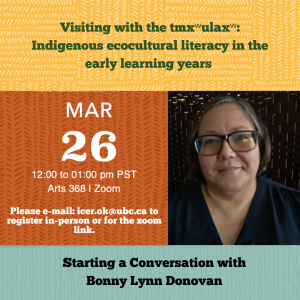 Wednesday, March 26
Wednesday, March 26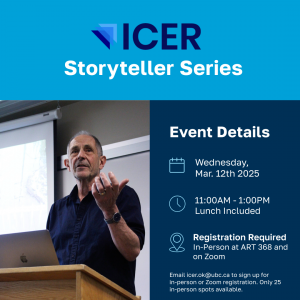
 Wednesday, February 26,
Wednesday, February 26,